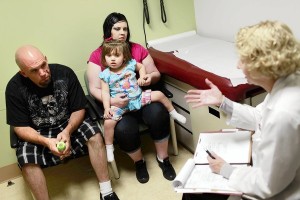Clinical laboratory professionals and pathologists should be aware of significant levels of errors in clinician gene test orders
Almost one-third of medical laboratory test orders for complex gene tests contained mistakes in handling by ordering clinicians. This finding comes from a study by ARUP Laboratories, Inc.. The finding is an early warning flag for pathologists and clinical laboratory professionals that a gap exists between the availability of genetic tests and clinician knowledge of how and when to use them and how to interpret the results.
ARUP Study Shows Errors in Gene Test Ordering
ARUP researchers reviewed orders for gene tests from February to December 2010, reported Bloomberg.com in a story it published on September 9, 2012. ARUP is one of the nation’s largest reference and esotoric testing laboratories. Its researchers found that 30% of gene test orders submitted to ARUP Labs during this time period came with mistakes by ordering physicians.

In a study conducted by ARUP Laboratories of Salt Lake City, Utah, it was determined that 30% of the clinical laboratory test orders for gene tests contained errors that originated with ordering physicians or their office staff. A reporter for Bloomberg.com observed that this finding indicates that physicians are failing to keep up-to-date with advances in the field of genetic tests and how they should be used in patient care. (Photo by GeneticsandSociety.com)
“The misordering of genetic tests is a common occurrence in diagnostic laboratories, stated the ARUP white paper, titled “Value of Genetic Counselors in the Laboratory.”
Christine E. Miller, M.S., LCGC, a genetic counselor at ARUP Laboratories, noted three types of errors, according to the Bloomberg story. They included:
- requesting the wrong gene test;
- mixing up rare diseases with similar names; and
- ordering a gene test for one cancer mutation, even though the family history suggested a different gene test would be more clinically appropriate.
Today, some 2,700 diseases can be identified through gene testing, according to a National Center for Biotechnology Information website on gene tests. That’s up roughly 30% since 2000. This is important because genetic testing often forms the basis of irreversible treatment decisions. Consequently, any errors are potentially catastrophic.
Studies Point to Need for More Physician Training in Genetic Testing
Other recent studies point to a general lack of training among doctors who authorize DNA tests and who must explain the results to patients.
A study from Columbia University surveyed 220 internists, Bloomberg reported. Roughly 74% of respondents said that their knowledge of genetics was somewhat or very poor. Additionally, 79% said they wanted more training on when it would be most appropriate to order the gene tests.
“Even if you have been out of medical school for five years, you are totally out of date,” commented Wendy K. Chung, M.D., Ph.D., a pediatrician and geneticist at Columbia University Medical Center, in the Bloomberg piece. Chung was a co-author on the study.
Genetic counselors at Yale Cancer Center published two studies on clinician errors in ordering gene tests. The errors included misordering and misreading or misinterpreting gene tests, reported Bloomberg.
The first study was published in August 2010 in the journal, Connecticut Medicine. The second study was published in the July-August 2012 edition of The Cancer Journal. The studies found that doctors:
- had not completely filled out the medical laboratory test order;
- had ordered the wrong test; or
- were not familiar with recommended screenings for patients who test positive.
Clinically relevant knowledge of the human genome is exploding. This means that the use of complex genetic tests and potential for catastrophic errors in genetic test ordering will also increase.
“If we can’t even interpret relatively simple genetic tests for one or two genes, how are these people going to interpret a complex panel that includes tens or thousands of genes that are rare and we know little about?” stated Ellen T. Matloff, CGC, Director of Cancer Genetic Counseling at Yale School of Medicine. Matloff is a senior author on the two studies.
All clinical laboratory managers and pathology groups should be aware of the problem of physician error in ordering gene tests. Medical laboratory executives will want to integrate into their strategic planning ways to help physicians acquire the knowledge to assure that the right genetic test is ordered at the right time for the right patient.
—Pamela Scherer McLeod
Related Information:
Fumbled DNA Tests Mean Peril for Breast-Cancer Patients
“Value of Genetic Counselors in the Laboratory”; White Paper by ARUP Laboratories
Gene Tests: Growth of Laboratory Directory
Adverse Events in Cancer Genetic Testing
THE DARK REPORT: Genetic Testing Genie Is Now Out of the Bottle




Has this study been published by ARUP?
If so, please provide reference.
Thank you